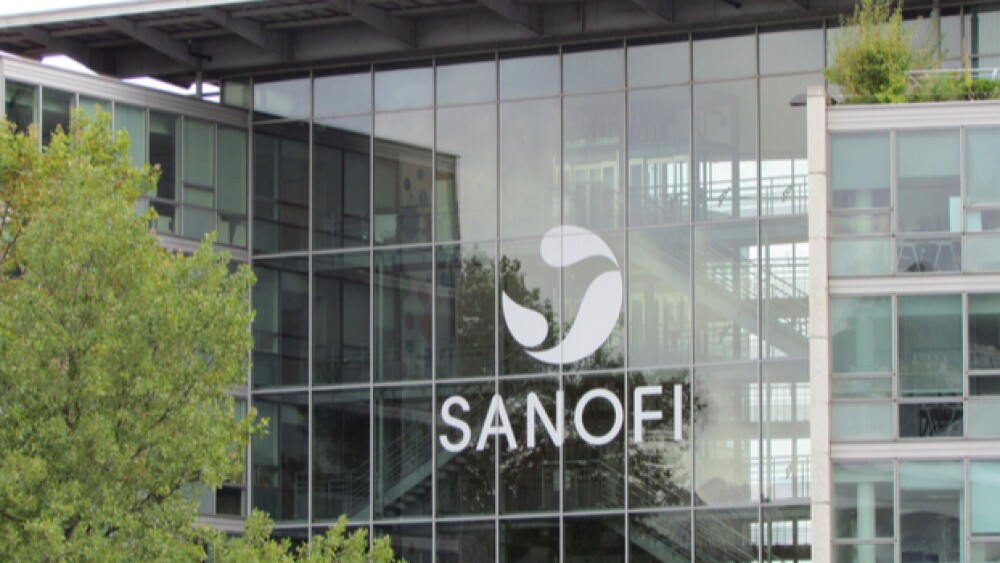Paris-based Sanofi announced positive results from its pivotal Phase III trial of isatuximab in patients with relapsed/refractory multiple myeloma.
Keitma / Shutterstock
Paris-based Sanofi announced positive results from its pivotal Phase III trial of isatuximab in patients with relapsed/refractory multiple myeloma. The drug, in combination with Celgene’s Pomalyst/Imnovid (pomalidomide) and low-dose dexamethasone, met the primary endpoint of prolonging progression-free survival compared to patients receiving the standard of care, which is pomalidomide and low-dose dexamethasone alone.
Sanofi indicates they will present the results at an upcoming medical conference and plan to submit to regulators later his year.
“We are excited by these results, which represent significant progress in our ambition to extend the lives of multiple myeloma patients,” stated John Reed, head of Research and Development at Sanofi. “We look forward to engaging with regulatory authorities with the goal of bringing this potential new treatment to patients as quickly as possible.”
The clinical trial, dubbed ICARIA-MM, evaluated 307 patients with r/r multiple myeloma across 96 sites in 24 countries. All participates had already been treated with two or more anti-myeloma therapies, including at least two consecutive cycles of lenalidomide and a proteasome inhibitor dosed alone or in combination.
Isatuximab was administered via an intravenous infusion at a dose of 10 mg/kg once a week for four weeks, then every other week for 28-day cycles in combination with standard doses of pomalidomide and dexamethasone.
Isatuximab targets a specific component of the CD38 antigen. This, in turn, triggers multiple mechanisms of action that Sanofi believes promotes programmed tumor cell death and modulates the immune cells. CD38 is uniformly expressed on multiple myeloma cells.
ICARIA-MM is one of four ongoing Phase III trials evaluating isatuximab in combination with other standard treatments for r/r or newly-diagnosed multiple myeloma.
Isatuximab was granted orphan designation for rr/ multiple myeloma by both the U.S. Food and Drug Administration (FDA) and the European Medicines Agency (EMA).
If isatuximab is approved and makes it to market, it will compete with Johnson & Johnson and Genmab’s anti-CD38 antibody Darzalex (daratumumab). Darzelex was approved in 2016 as a fourth-line treatment. In 2018, it was approved for first-line treatment. In 2018, Darzalex sales passed $2 billion, an increase of 63 percent since 2017.
Even more, competition is possible with MorphoSys’ MOR202 and Takeda’s TAK-079, both in mid-stage clinical trials. And J&J and Genmab are working to develop a subcutaneous formulation of Darzelex, which would make it more desirable by patients and physicians because of easier administration.
Bristol-Myers Squibb and AbbVie have Emplicity (elotuzumab). This drug targets SLAMF7 instead of CD38. It was approved for r/r multiple myeloma in 2015 in combination with Celgene’s Revlimid (lenalidomide) and dexamethasone. In 2018, the two companies reported positive Phase II data for the drug in combination with Pomalyst/dexamethasone.
Sanofi has a checkpoint inhibitor, Libtayo (cemiplimab), which was approved by the FDA for cutaneous squamous cell carcinoma in September 2018. The company is testing Libtayo and isatuximab in combination for myeloma and solid tumors.
One aspect of isatuximab of note—the drug was discovered and developed in-house. Sanofi has long partnered with Regeneron for drug discovery and development. On January 6, Sanofi agreed to pay Regeneron $462 million to revise their immuno-oncology partnership. This was designed to give Sanofi more flexibility to advance its early-stage immuno-oncology pipeline, while Regeneron will retain all rights to its other immuno-oncology discovery and development programs.





